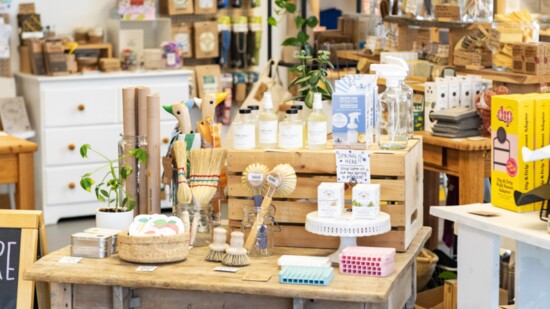Nearly ten years ago, Laura Marston made a New Year’s resolution to stop buying single-use water bottles. “One, why am I buying water? And two, why am I making this trash that’s not necessary?” she remembers thinking. “I started learning about recycling and about plastic in the environment, and that was my gateway to discovering how toxic it is for marine life, for birds, and for humans.” Marston noticed a gap in the market: she could refill some bulk foods at the co-op, but there was nowhere in Portland offering package-free personal care products or cleaning supplies. In response, she founded GoGo Refill, a one-stop, zero-waste shop for refillables (think dish soap, body wash, laundry detergent, deodorant, shampoo, skincare, and more) alongside sustainable grab-and-go products with locations in South Portland and Brunswick.
What simple everyday habits can people adopt to reduce plastic waste in the home?
The simplest thing is a mindset shift: start thinking about what is going to happen to a product or package at the end of its life. The key to low-waste living is making decisions on the trash that will result before you buy something. You’re not going to be able to prevent all plastic from entering your home, but put an emphasis on reducing before recycling.
How does the refill model work?
Consider something like laundry detergent. It comes in a big plastic jug, and when it’s empty, you’re supposed to recycle it. Instead of getting rid of the jug, just wash it, bring it into a shop like GoGo Refill, and we’ll refill it for you. Every time you reuse a container, you’re cutting its carbon footprint.
GoGo Refill’s refillable supplies are non-toxic and biodegradable. Does that mean consumers are sacrificing quality?
Definitely not. One of the great things about the refill model is that you can get just a sample—you don’t have to commit to a full container of anything. If you want to find out what laundry detergent works best for you, we’ve got options: liquid, pods, powder, and sheets. You can try just a little bit, or test them all out. We have a team of what I like to call low-waste experts, and we love helping customers find the right product to fit their needs.
Are there any eco-friendly alternatives to paper towels?
The average family spends over $250 a year on paper towels, which are really energy intensive to produce. We have a great “unpaper towel” that’s basically a cotton-flannel alternative you can wash and reuse. But you don’t have to buy something fancy like that—you can just use a rag, or an old t-shirt, or whatever material works for you.
What is greenwashing, and how can consumers watch out for it?
Greenwashing is when a product’s marketing claims to be eco-friendly but the product itself is not. When looking at the ingredients on the package, I often turn to the Environmental Working Group website (ewg.org) to learn more about what’s actually sustainable and eco-friendly.
How can switching to refillable and eco-friendly products impact not just our homes but the greater community and the environment?
GoGo Refill has been open for five years, and we’ve helped to reuse nearly 300,000 plastic packages through refilling. It benefits the individual because we’re not making as much trash in our homes, but it also affects our municipalities in the way we’re reducing the solid waste that we pay the city to handle. If we make less of it, then we’re not paying as much for it. That’s also 300,000 packages that won't end up in the environment and be broken down into microplastics and eaten by animals.
"Single-use plastics are so pervasive in our culture that we don't even see them anymore. Making the distinction between single-use and reusable is a helpful way to categorize items that are coming into your home."
